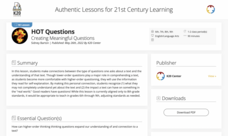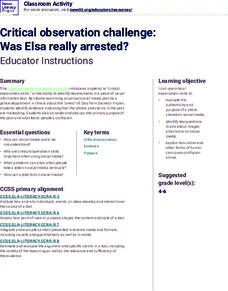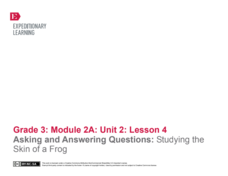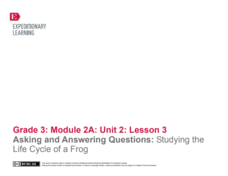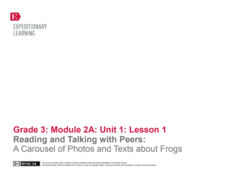University of Minnesota
Inquiry Cubes
How do you teach kids to "science" effectively? Inquiry cubes are a "sort of" puzzle with no answer—promoting even more questions! Group members work together to use the evidence on the visible sides of each cube to infer what lies on...
Curated OER
Socratic Seminar
To conclude their study of the letters of Abigail Adams, class members engage in a Socratic seminar where they discuss her writings and what her letters reveal about her.
K20 LEARN
HOT Questions: Creating Meaningful Questions
Scholars examine a list of questions and sort them into corresponding groups based on similarities. A gallery walk allows peers to see how their peers sorted questions and leave notes. Costa's Level of Questions is the topic of a...
Overcoming Obstacles
Gathering Information
Before making important decisions, gathering as much information as possible is best. That's the take-away from the second lesson in the Decision-Making module of the Overcoming Obstacles course. Middle schoolers engage in a series of...
Newseum
Quick Skim or Deep Dive? Picking the Right Search Strategy
To search online to find answers to some questions requires only a quick skim, while others demand deep research. Scholars engage in a lesson that teaches them the difference and how to craft questions that produce the best online search...
Newseum
Civil Rights: Knowns and Unknowns
Class members generate a list of research questions to review the civil rights movement and determine what scholars still need to learn. Groups then select a different compelling question, create a hypothesis and find evidence to support...
News Literacy Project
Critical Observation Challenge: Was Elsa Really Arrested?
A 14-slide presentation showcases a social media post featuring Disney's Elsa from the movie, Frozen. The seemingly harmless post received lots of attention, raising the question, how do we know posts are factual? Scholars go through...
PBS
Curious George: Fan and Blow
What kind of wind works best to make things move? After watching a short video from Curious George, super scientists answer the question by testing various wind-making tools. Learners observe, record, and share their findings.
American Museum of Natural History
One-on-One With The Sun
Follow along as Stella Stardust interviews the sun. A fun and informative interview provides scholars with information about the sun.
Angel Island Immigration Station Foundation
Interview a Family or Community Member: Taking Oral Histories
Young scholars gain insight into how historians record events by engaging in an oral history project. In preparation, class members brainstorm open-ended interview questions and take part in and debrief a mock interview simulation....
Angel Island Immigration Station Foundation
Interrogation of Immigrant
Imagine being interrogated by someone you don't know about minute details of your life. Imagine that the interrogator is matching your responses to the answers of other family members. Imagine how you would feel knowing that the...
EngageNY
Interviewing Meg Lowman: What Does it Mean to be a Responsible Scientist? (Pages 37–39)
Can I ask you something? Scholars read about the night walk on pages 37-39 of The Most Beautiful Roof in the World. After discussing the text with their group, they work together to create interview questions they would ask Meg...
EngageNY
The Five W’s
Let's take the big W. Scholars analyze the model newspaper article Sandy wreaks havoc across Northeast; at
least 11 dead and look to answer who, what, when, where, and why. They work in groups of three to complete a Five W’s web...
Education Bureau of Hong Kong
Decision-Making
Making decisions about things like what to do after high school can be a challenge. So many factors are involved. The decision-making worksheet in this resource helps to simplify the process by asking individuals to fill in a matrix for...
EngageNY
Introducing the Research Project: Asking the Right Questions
Road trip! Scholars take a look at a researcher's roadmap as they begin discussing the research process. They view the research performance task portion about Pygmalion, and then hunt for research process cards hidden under chairs....
Western Justice Center
Communication Skills
Good communication skills are key to resolving conflicts. A short video introduces learners to the concept of active listening and provides tips that will help them resolve conflicts. Class members then read articles, analyze scenarios,...
EngageNY
Reading about Freaky Frogs: “The Amazon Horned Frog"
The Amazon Horned Frog is the focus of a activity designed to encourage readers to ask and answer questions. A frog-themed poem opens the door to a whole-group discussion. Following a read-aloud of an informational text, a three-page...
EngageNY
Asking and Answering Questions: Studying the Skin of a Frog
English language arts and science combine in a lesson that focuses on asking and answering questions about frog skin. Discussion, a read-aloud, and partner work lead the way towards a three-page worksheet that tests learners'...
EngageNY
Reading about Freaky Frogs: “The Glass Frog”
Freaky frogs are the focus of a lesson plan designed to boost reading comprehension skills using text features and asking and answering questions. Informational text and a poem supply scholars with animal-related vocabulary and facts. A...
EngageNY
Asking and Answering Questions: Reading about a Frog's Habitat
Building upon previous lessons, scholars take to asking and answering questions about a frog's habitat. A partner discussion follows a read-aloud of an informational text in preparation for a worksheet that boosts reading comprehension...
EngageNY
Asking and Answering Questions: Studying the Life Cycle of a Frog
A lesson challenges learners to ask and answer questions about the life cycle of a frog. With a class read-aloud, partner discussion, and notebook reflections, scholars complete a three-page worksheet to prove their understanding of the...
EngageNY
Reading and Talking with Peers: A Carousel of Photos and Texts about Frogs
Frogs are the theme of a lesson plan that challenges scholars to examine photographs, read informational texts, then ask and answer questions. Scholars work collaboratelively as they rotate through stations, discuss their observations,...
Florida Center for Reading Research
Comprehension: Monitoring for Understanding, What Do You Know?
An activity promotes reading comprehension. Readers analyze a text of their choice while activating prior knowledge and asking and answering questions. Scholars enforce multiple strategies to improve comprehension.
California Academy of Science
Food for Thought: Defining a Problem to Find a Solution
Scholars approach a problem trying to plan a meal for a class party. They learn about the restrictions and must decide what information they need to plan the meal. The first lesson in a 13-part unit on Our Hungry Planet encourages...




